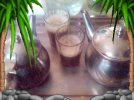Yet another good reason for drinking black tea:
_http://www.naturalnews.com/037675_black_tea_bioterrorism_defense.html
_http://www.naturalnews.com/037675_black_tea_bioterrorism_defense.html
(NaturalNews) Compounds found in black tea can neutralize bioterrorism microorganisms
Could the natural compounds found in black tea be powerful enough to successfully counter the deadly effects of a biological terrorist attack? New research out of the U.K. seems to suggest so, having found that a specific compound abundant in tea effectively deactivates and neutralizes ricin, a highly-toxic chemical byproduct of castor beans that is often used in attempted acts of biological terrorism.
Dr. Simon Richardson, a senior lecturer in Biopharmaceutical Sciences at the University of Greenwich School of Science in the U.K., and his colleagues examined the various compounds naturally found in tea and discovered that one in particular, which was not named in their research, disables ricin's toxic effects. And if extracted from tea into processed form, Dr. Richardson believes the compound could hold the key to potentially thwarting biological terrorism.
"One cup of char (British slang for tea) won't cure you if you have been poisoned, but compounds extracted from tea could, with further research, provide an antidote to poisoning following a terrorist attack," says Dr. Richardson. "I've been working on neutralizing ricin poisoning for about six years as a byproduct of my work in drug delivery ... the next stage, as well as securing more funding, is seeing if other components of tea have a greater effect."
An earlier study out of Wales found that Epigallocatechin gallate (EGCG), an antioxidant polyphenol that is recognized as a principal property of tea, also has the ability to inactivate ricin. Likely the same compound identified by Dr. Richardson, EGCG was shown to defuse not only ricin, but also a host of deadly microorganisms, toxins, and other harmful compounds.
"We already knew that tea had the ability to inhibit anthrax -- as long as it is black tea with no milk," says Professor Les Baillie from Cardiff University's School of Pharmacy and Pharmaceutical Sciences, who led the research out of Wales. "Our new findings suggest that if the security services want to counter the threat of ricin, they may find the answer in their morning cup of tea."
EGCG is already widely available in supplement form, which means the public does not have to wait for further research to be conducted on the compound in order to experience its poison-fighting benefits.
Also commonly marketed as green tea extract, EGCG has been shown to help promote the proper growth and maintenance of brain cells, prevent the development and proliferation of cancer cells, alleviate diabetes, deter heart disease, promote healthy weight maintenance, and prevent the onset of Alzheimer's disease and other forms of dementia.

 :
:



